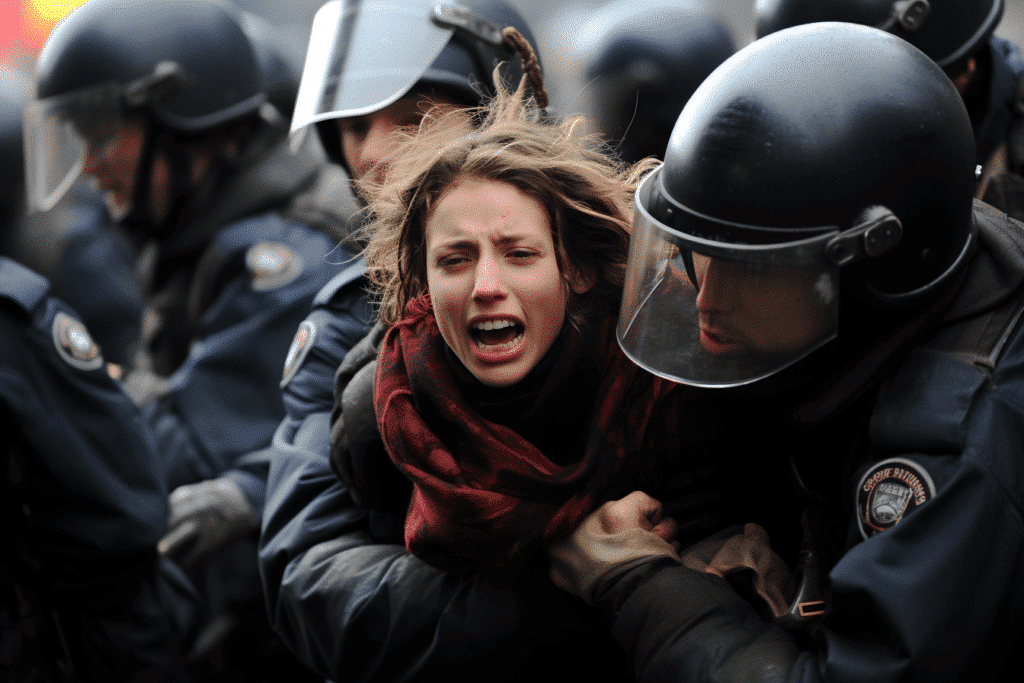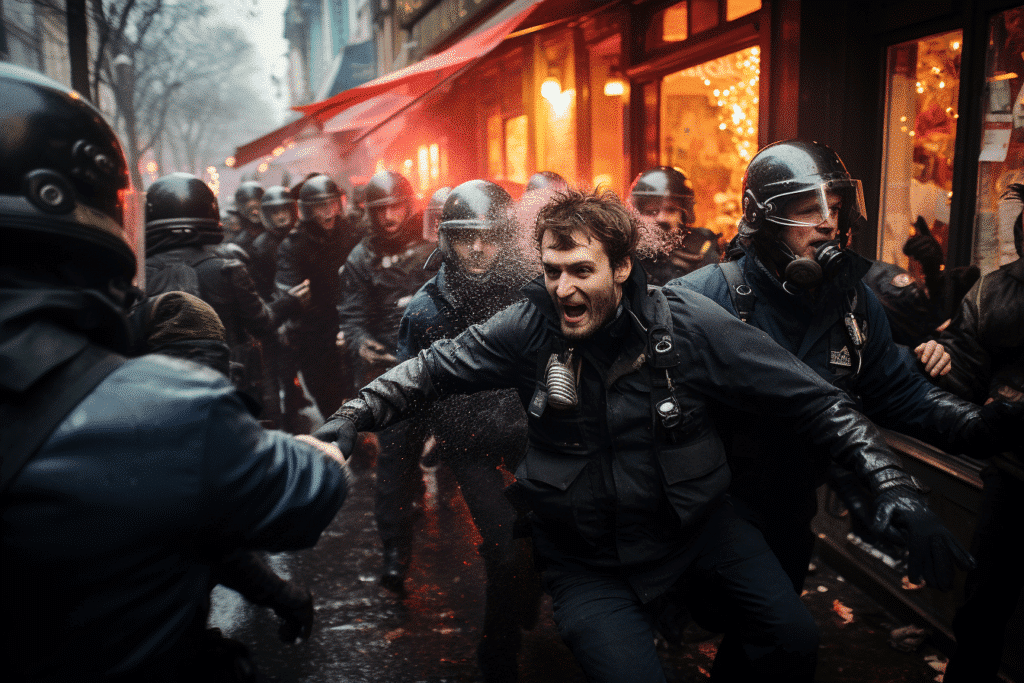Certain countries are employing legal instruments that were initially introduced to combat organized crime and extremist groups
Roadblocks on major highways in the United Kingdom caused traffic chaos, protests at oil facilities in Germany disrupted energy supply, and in France, thousands of activists clashed with the police over water resource usage, resulting in numerous injuries.
To prevent the resurgence of such protests, an increasing number of European countries are taking drastic measures. For instance, federal states in Germany and national authorities in France are invoking legal instruments originally designed to combat organized crime and extremist groups.
These powers are now being used to monitor activists and pursue legal action against them, as revealed in conversations between the Reuters news agency and four prosecutors, law enforcement officials in both countries and over a dozen demonstrators.
A deluge of climate protests through direct actions has captured attention across Europe
In Berlin alone, the police have spent hundreds of thousands of working hours processing over 4,500 incidents related to the groups “The Last Generation” and “Extinction Rebellion,” according to unpublished police data.
In Germany, state authorities extensively employ preventative detention to deter people from participating in protests. This includes the imprisonment of at least one person for up to 30 days without charges, as confirmed by prosecutors interviewed by Reuters, citing Bavarian law.
In July, France, and in May, the UK introduced new surveillance and arrest laws. In the UK, attaching or gluing oneself to a property is now considered a crime.
France has even tasked anti-terrorism units with interrogating climate activists, as confirmed.
While the governments in Germany and the UK emphasize that their response to the protests aims to prevent harmful criminal actions, the French government has declined to comment. However, they have previously stressed the need for the state to counter what it views as “radicalization.”
The activists, on the other hand, explain that they have chosen this form of direct action after other protest strategies did not yield the desired results.
Civil disobedience is a historically established tool in social movements, having played a significant role in fights for women’s suffrage and the American civil rights movement, for example.
Reuters could not confirm whether the coordination of policies or surveillance of demonstrators among European countries goes beyond regular police cooperation.
A source within the French government familiar with the situation, however, stated that intelligence agencies collaborate across Europe to monitor the plans and activities of the demonstrators.
In response to a Reuters inquiry about information exchange regarding climate activists between European governments, the German Interior Ministry stated that it regularly shares information with international partners but refused to provide further details.
Both the police and the French Interior Ministry declined to comment. The National Police Chiefs’ Council in the UK did not immediately respond to an inquiry, and the UK Home Office did not provide a comment.
In Germany, there is no specific national policy targeting climate activists. The federal government regards these groups as predominantly non-extremist, according to a spokesperson from the Federal Ministry of the Interior.

Two German states are considering the possibility of banning a leading group within the movement
The Bavarian State Prosecution has initiated a stringent approach against the group known as “The Last Generation,” currently examining whether they can be classified as a criminal organization under the law. Such classification would permit extensive measures including telephone surveillance, GPS tracking, and home searches.
Investigations against “The Last Generation” have been entrusted to a state special unit dedicated to combating terrorism and extremism. This step was taken due to suspicions that the group has committed crimes, including attempts to sabotage critical infrastructure, as stated by a spokesperson from the State Prosecution.
Similar inquiries are underway in the state of Brandenburg, as confirmed by the Ministry of Interior to Reuters.
In response to a query from Reuters, “The Last Generation” refuted accusations of engaging in criminal activities. The group emphasized that activists openly display their identities during protests and announce events in advance.
The prosecution’s investigation into the group particularly focuses on an incident where a valve on the Transalpine Pipeline in Bavaria was shut, along with a protest staged in front of a refinery in Brandenburg. “The Last Generation” confirmed its participation in these protest actions.
In May, the police conducted searches at the residences of seven leaders within the “Last Generation” group across different states. According to the Bavarian State Prosecution, which communicated this to Reuters, the phones of six of the leaders were under surveillance prior to the raids, aiming to classify the group as a criminal organization.
To halt donation collection, the group’s website was also taken down. Should the group be banned, supporting the group could lead to imprisonment under German law.
Bavaria’s Ministry of Interior informed Reuters, citing relevant state law, that over the past 18 months, preventive custody of more than 24 hours was imposed on climate activists at least 80 times.
Furthermore, the ministry confirmed the 30-day detention of an activist. However, “The Last Generation” group stated that a total of nine individuals were detained for a 30-day period.
This approach illustrates how Bavaria applies regulations allowing the police, upon court order, to detain individuals for up to a month without formal charges to prevent potential crimes.
The ministry did not provide additional information about the detained individuals or the reasons for their detention. Reuters was unable to promptly verify whether any of the detained activists were subsequently charged.
In response to the protests, Berlin is working on a new law to regulate the handling of activists and demonstrators
Since last year, activists in Berlin have organized hundreds of street blockades. According to the Berlin Police Department, as of July 6th, over 480,000 working hours have been spent processing 4,519 newly registered suspected criminal offences by environmental activists. The Berlin Public Prosecutor’s Office announced that by June 19th of this year, they had initiated more than 2,200 investigative proceedings against activists from the groups “The Last Generation” and “Extinction Rebellion.”
However, the provided data did not include specific details about the nature of the offences under investigation.
In response to these ongoing protests, the lawmakers of Berlin are currently considering a draft law that would allow suspects to be detained for up to five days – instead of the previous 48-hour limit, as stated by a spokesperson for the Berlin Senate in an interview.
While Germany aims to achieve net-zero emissions by 2045 and France by 2050, in line with scientific recommendations, both countries have missed their annual targets over the past two years. Given that Earth experienced its hottest days on record in July, activists are emphasizing the urgent need for action.

Actions and Reactions in France
By the end of 2022, climate activists, dressed in white protective suits, infiltrated a French cement factory owned by Lafarge Holcim during the night. Using bolt cutters, they severed power lines and destroyed equipment with hammers, as depicted in a video released by the group Les Soulevements de La Terre (SLT).
A spokesperson for SLT stated that while the group supported the action, they were not the ones who organized it. The spokesperson also emphasized that the presumption of innocence applies to individuals who have been apprehended until proven otherwise.
In March, SLT members took part in a protest aimed at disabling irrigation reservoirs under construction. These reservoirs were intended to pump groundwater for large agricultural operations in a drought-affected wetland area in Deux-Sèvres, within the Nouvelle-Aquitaine region.
Approximately 6,000 demonstrators faced around 3,000 gendarmes, who fired over 5,000 tear gas grenades in a span of two hours. The resulting chaos led to injuries for 200 demonstrators. Two of them fell into comas, and one protester lost an eye. 47 police officers were injured, and four police vehicles were set on fire.
The violent course of the water protest triggered significant unrest. Human rights groups and protesters accused the security forces of using excessive brutality. In contrast, the government accused the activists of appearing armed with steel bowling balls and petrol bombs, and of preparing for a confrontation.
Military prosecutors are currently investigating whether disproportionate force was employed by the gendarmes.
Based on a law passed in 2021, the Ministry of the Interior has banned the SLT group for alleged incitement to violence. The SLT has appealed against this ban.
Two French security sources informed Reuters that surveillance of eco-activists had increased since 2018, but did not disclose further details. The police and the Ministry of the Interior declined to comment on this matter.
During a hearing at the Administrative Court on Tuesday, where the SLT requested the suspension of the government decree dissolving the group, the legal representative of the Ministry of the Interior confirmed that state surveillance measures had been conducted against members of the group.
“Individuals claiming to belong to SLT automatically fall within the jurisdiction of intelligence services,” explained Pascale Leglise, emphasizing that “of course, not every person is the target of surveillance actions.”
